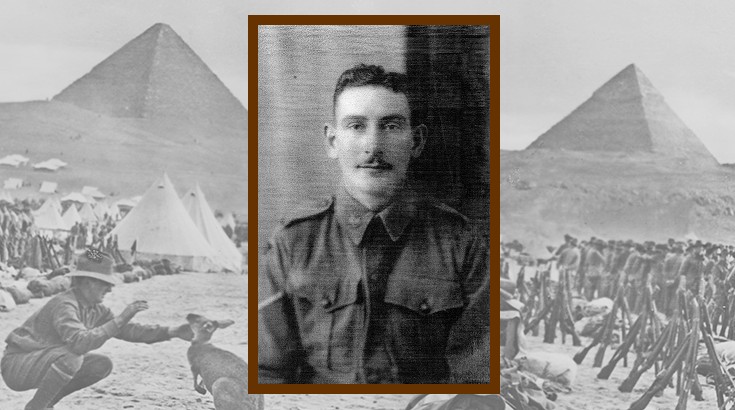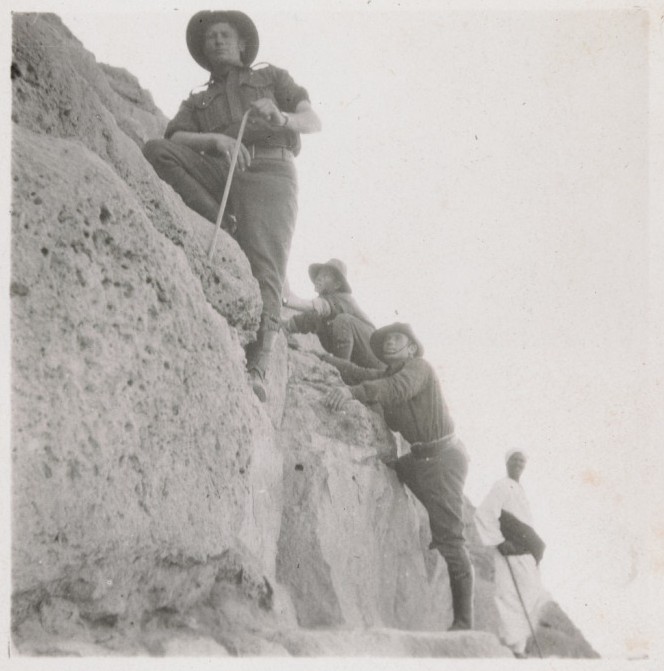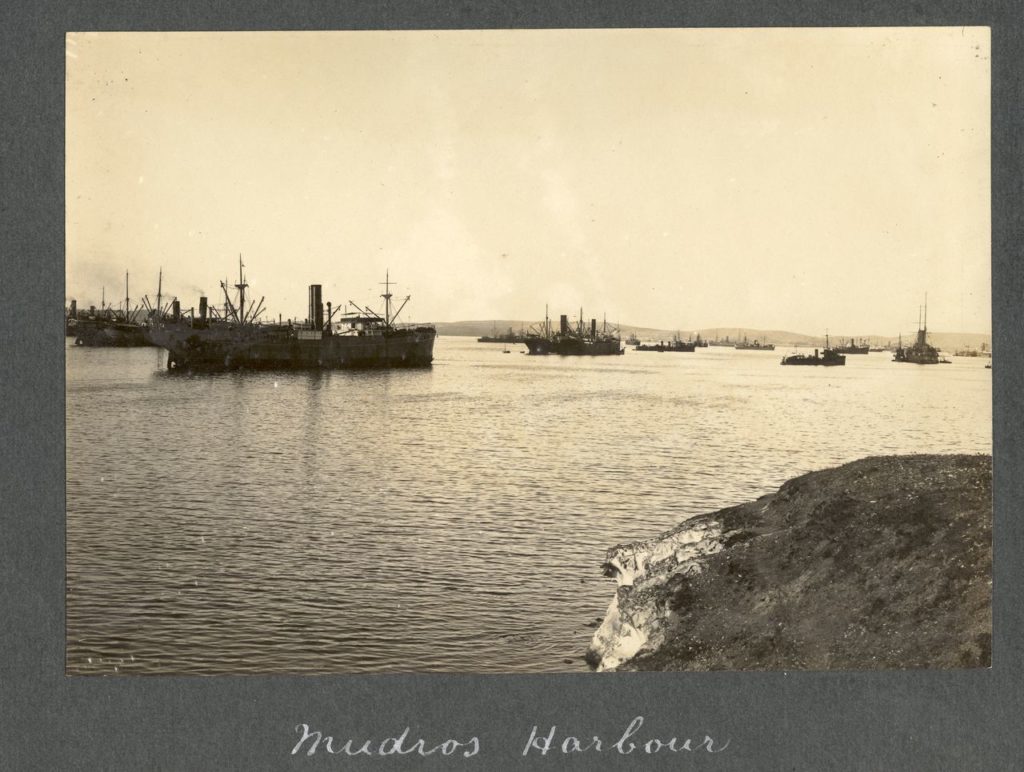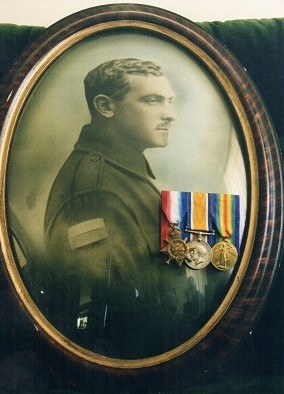
by Malcolm R. Hughes
The article below was written by V.H. Solomon and retyped by his great nephew M. R. Hughes with some spelling mistakes unchanged.
THE GREAT WAR
An Account of the Experiences of Private Valentine Henry Solomon No 868 “D” Company 18th Battalion 3rd Brigade 1st Division of the Australian Expeditionary Forces.
I enlisted at Geraldton and went into camp at Blackboy Hill in September 1914. When war broke out I was on Fortree Station near Port Hedland West Australia engaged in wool classing. I later came to Geraldton and hearing that Australia intended sending forces to assist the Imperial Authorities I immediately volunteered.
We embarked on the “Madic” at Fremantle on 31st October and proceeded to Gage Roads where we remained at anchor until the morning of Monday 2nd November. About 4 a.m. we put out to sea and joined the fleet on Tuesday morning about 11 o’clock. The Fleet consisted of 38 troopships convoyed by 6 Warships – It was a magnificient sight .
We fell into our position and proceeded uneventfully until off Cocos Island when we saw the Australian Cruiser “Sydney” darting off towards Cocos Island in a north easterly direction. She passed within half a mile of our vessel coming from astern. – This was in the morning about 9 oclock, and that evening the wireless message was posted up in our troopship that the “Sydney” had engaged and sunk the “Emden”.
There was great excitement on board at the news which was eagerly discussed by the troops in small groups until the sounding of the last post at 9.30 when we retired for the night. We arrived at Colombo up to time, and remained there for two days – None of our men got ashore there – The harbour was full of warships and transports – The “Sydney” had shortly before our arrival come in with the men wounded in the Cocos Island action.
On board the troopship we were awakened at 6 a.m. and had to roll up and stow hammocks and blankets. From 6.45 to 8 o’clock we had to fall in for roll call and physical drill. Breakfast at 8 o’clock. We then had to shave and get cleaned up for rifle parade at 10 o’clock.
We were given from 12 o’clock till 2 o’clock for dinner and a spell, after which we had either drill sports or addresses or lectures from officers. We were given tea about 5 o’clock and were then free for the evening which we spent in playing games, reading, concerts and other amusements. Mostly card games were played.
We left Colombo still convoyed by Warships except the “Sydney”. An Indian Contingent also convoyed by warships passed us 3 days after leaving Colombo. At Aden we hove to about 4 miles from the town for about three days. In the Red Sea it was red hot.
When passing through the Suez Canal we saw the great preparations in the way of fortifications that were being made by the British troops assisted by the Indians in anticipation of a Turkish attack. The British and Indians cheered us lustily as we passed through. We were anchored in Port Said Harbour for 1 day, and then went outside where we remained for a week while the other boats went on to Alexandria to disembark.
We had previously been informed when near Aden that we were to go to Mena Camp in Egypt for 6 months training before going to the front, whether that would be in France or elsewhere we did not know. We disembarked at Alexandria in the early part of December.
We had one hour’s leave which we spent in looking around Alexandria before being entrained for Cairo a hundred miles distant. We arrived at Cairo about 1 a.m. next day where we were served with hot coffee and a biscuit. We then boarded trains and arrived at Mena at 3 a.m. We found some difficulty in finding our lines. No one seemed to know where the 11th and 18th Battalions were, but we ultimately succeeded in reaching our destination.
When marching from the train terminus to the camp we saw the Pyramids for the first time. The moon was just setting and in the fading light the Pyramids loomed up dark and majestic mystifying the brain of the spectator with thoughts of the countless ages that those oriental statues stood for and the many scenes of victory and defeat, abundance and famine, grandeur and poverty they had been the silent witnesses of.
We had barely got to sleep as it seemed when we were aroused by the reveille and gazed on a scene which was to be our daily outlook for 12 weary weeks to come. We were kept at work until 12 o’clock when we were given leave until 10 p.m.
We all went off to make a closer inspection of the Pyramids. It took a half an hour to reach them. We entered the largest Cheops in which several Kings and Queens are supposed to have been buried. After climbing up about 20 or 30 feet one enters the main Chamber which is about 15 feet square, and 8 feet high. Here natives take charge and guide you through the corridors to two large chambers where the kings had been buried and exhumed in later years.

We climbed to the top of Cheops about 400 feet and obtained a splendid view of the Nile and its delta on one side and the desert on the other. After brigade and division training until Feb 28th we embarked at Alexandria for an unknown destination. We sailed on 2nd March and arrived three days later at Lemnos Island. Here we remained until 24th April.
The island is a beautiful place with a magnificent landlocked harbour. We covered the whole of the island during our training. There are a number of villages scattered about. The population in all is about 6000, mostly Greeks. The women work in the fields and spin wool. Boys and girls shepherd the sheep.

Everything is old fashioned and must have remained in that condition for thousands of years past. Wooden ploughs drawn by oxen are used in the fields, and the wind-mills of olden days are much in evidence. During our stay we practised landing operations in the early morning. On 24th April about 8 p.m. Our company was embarked on the transport ship “Suffolk” when she sailed for Labros Island where we arrived at midnight.
We were off duty during that time, and had instructions to get as much rest as possible. We know we were shortly to go into action and were very pleased at that prospect. At midnight we were served with a hot meal of stew and potatoes before being transferred to a destroyer. The transport was in darkness from sunset and the destroyer likewise.
On board the destroyer we were very cold, and we got as near the engine room as we could to keep warm. We were in full marching order our overcoats being in the packs which we carried on our shoulders. The destroyer towed a number of rowing boats in which we were to land. When the destroyer stopped we could see the land ahead of us, and we quickly slipped into the boats and were rowed by pinnaces toward the shore.
We had to pull the last few yards to the shore. I was on one of the oars. Before we reached the shore the bullets were flying around us as the enemy has been apprised of our coming, and was giving us a warm reception. Several in our boat were hit. We were now beginning to realise that we were tasting war, but had no time to think of what it meant.
I jumped into the water up to my waist. When we reached the shore we were ordered to charge and went inland like demons, with bayonets fixed. The Turks were running for all they were worth. I went for one with a bayonet, but he was too fast for me. It was now quite light. We quickly got inland about two miles and then encountered the Turks in great force. Our company was sent out as a covering party while the main line was being dug in on the ridge behind us of which we were about 300 yards in advance.
About 3 p.m. I was lying in a cart track having occasional shots at the enemy when we saw them advancing. The bullets were spluttering and shells were bursting all around. Presently a machine gun got to work, and I heard it spraying its deadly lead along our line, and finding its mark here and there.
I stopped one of the bullets which entered my head behind the left eye coming through my neck on the left side and into the shoulder. I was also hit immediately afterwards in the right hand. I managed to get my equipment off and dropped everything.
I faintly recollect what happened afterwards. I struggled into a disused Turkish trench where the bullets were still flying around. I must have become delirious as I remember in a vague way staggering about between firing lined.
A comrade got hold of me and helped me to the dressing station where my wound was dressed with the field dressing. This was about 8 o’clock I should think. I was taken on a stretcher on board a pinnace and put on board a trawler hooked up to a hospital ship where we were taken on board next morning.

Grandnephew Mal adds:
That is not however the finish of Val Solomon’s wartime experiences. After being sent home to Australia for discharge, in August 1915, he re-enlisted in March 1916 and with new regimental number and unit sailed from Fremantle for England and France. However, after continuous illness he was again finally discharged at Fremantle in August 1917.
A copy of this “Account” was donated to the Battye (State Library) in Perth 7/11/2014, in the presence of my Uncle John Hamersley, one of Val Solomon’s nephews.
Gage Roads is the anchorage area outside of Fremantle Port Harbour.
Blackboy Hill was the Army camp at Northam about 50 miles ( 80 kms) east of Perth.
By coincidence, the date that I donated this article was 100 years and 1 month after the start of Valentine’s journey in 1914.
Mal this is beautiful and very touching. The guy looks like you. I mean you look like him.
But I see a kangaroo in the lower corner of the left picture at the pyramids. Don’t tell me the Diggers brought roos along as pets!
Mary you are right about the Aussie emblem, I hadn’t noticed. So there were Aussie soldiers, Aussie horses and Aussie kangaroos. The Egyptians must have thought they were about to be taken over by Colonials. Kangaroos would have been emblems, not just pets. When my unit went over to Vietnam we took a swamp tortoise from near our camp at Ingleburn NSW with us and painted its shell with our Corps colours. You know many years ago there was a book written about us titled “We’re a Weird Mob”.
Mal, it seems your uncle wrote that report 100 years ago. What does the piece of paper look like? Yellowed?
Was it folded into the family Bible, or did you stash it in a coffee tin for safety? Would not have been funny if it went up in a bushfire.
I’ll dig around in my metal filing cabinet for it tomorrow. I am not sure that it appeared yellow to the eye, but when it was copied a yellow colouring came up on the copy. From memories Mum may have had two copies which I would now have. One was on fairly thin paper (like letter writing paper from my early days) and of course was type-writer printed. I don’t know if Uncle Val, recorded it in hand or he typed it or had somebody type it for him. I believe he became a journalist after his time in the Army. Mum had kept at least one copy, not in a coffee tin, but a biscuit tin with other documents.
Fascinating account. Thanks for posting.
Tim, please reblog it. And everyone else, please reblog it. Anzac Dawn service is less than 48 hours away.
I think the copyright status of an essay written fully 100 years ago should not be a problem. (Note: some countries’ laws now use the date of death of the author and add on 70 years.)
Mal, you could send it to the War Memorial in Canberra. Bigger than a biscuit tin!
I’ve just noticed that the RSL runs a Youth Vigil in SA. Maybe in other states also?
“The State RSL ANZAC Eve Youth Vigil commences at 6.00pm on ANZAC Eve, Tuesday April 24, at the South Australian National War Memorial on North Terrace. Representatives from 10 youth groups conduct a 12-hour vigil that concludes just prior to the Dawn Service.
“The general public are invited to view the vigil and support the youth who are our custodians of the ANZAC traditions.”
Solomons account is the worst interpretation of existence I having come across for some years, my interpretation of this nightmare is existential in interpretation, Solomon with no or litttle knowledge of moral concern as to what the facts were in this war, he decided to join up as his mates did as a adventure and from the boring existence of civilian life, this civlian life is something we need to go into as another subject of scrutiny, here we have nationalism at its worst, it is obvious they do not know what they are in for by their account, the fact they can lay down their life or be killed as all part of normality of termsof war.
I suggest Gumtree and its followers having not followed this through, as to what war or implications of war is, war now generally accepted as normal is by my standard of conduct is not normal at all, the slogan that we all enjoy freedom and war has been useful is not what I accept as to the meaning of freedom is? one definition is that whilst Syria exists I am not free, in my own life I have not found freedon at all, although I have a typre of freedom within this has nothing to do with those who supposedly having died for my freedom, here i am saying that due to adverse circumstance such as being of death row or any other such infringments of physicle or mental torture have been known to find freedom within, such as if true a examle maybe if true Christ?
I suggest a area of land be donated to perpetual war, this is for those who want to be heroes and to be killed and to kill for reward of status such as parades, medals, participating in disabled sports from wounds of war, sorry not to get what Gumtree desires to interpret as good but it seems tome youare all o nthe wrong track.
Don, will you “review a book for us? I just saw it advertised at Trineday.com. Here is their description:
Free Radicals
War Resisters in Prison
By C J Hinke
“CJ Hinke was arrested in more than 35 civil disobedience actions organized by the pacifist movement from 1963 to 1969. He was the last American arrested for the Vietnam draft and was pardoned by Jimmy Carter in his first official act as US president. After moving to Canada, he defended himself before the British Columbia Supreme Court, and served prison time, including solitary confinement, for blockading clearcut logging and roadbuilding by multinational corporados. Fear is what keeps most citizens from active resistance.
“This book is intended to break that cycle of fear and encourage broad resistance to militarism. Free Radicals: War Resisters in Prison is the first chronicle of absolutist resisters to war from World War I through Iraq and Afghanistan, surveying military conscription and desertion worldwide. The book’s extensive bibliography on war resistance, conscription, and prisons is the first in its field.”
In the South African army in the 70s, the new recruits were lined up on Sundays to go off to church. The Anglicans, Catholics, the Dutch Reformers, the Jewish… etc. A small group remained. The atheists. Well there was only only thing for these troops: PUNISHMENT PARADE.
I’ve said on many occasions — we should sack our leaders for accepting war as the “normal” state of reality.
Don what else do you suggest Gumshoers’ do?
I draw the attention again to Rivero’s
ALL WARS ARE BANKERS WARS
https://gumshoenews.com/2014/09/20/all-wars-are-bankers-wars/
https://www.youtube.com/watch?v=5hfEBupAeo4
Why do I like the sound of “punishment parade”?
Don, as the presenter of the article, I do not take exceptions to your piece. I believe what you have said is true. But unfortunately while most young people are brainwashed into believing that they MUST go off and DEFEND their country, this tradition will continue. I was caught up in the Vietnam, conscription debacle. I did not at the time believe that Australia should be involved in that ridiculous conflict. Today I believe it was a War Crime event.
I did believe that National Service was not a problem. It was a character building exercise for many, but the National Serviceman should only have had to defend Australia if we were attacked by an external force.
I was caught out, because although I was against the idea of fighting overseas, we had a tyrannic government under Robert Menzies, who used this situation to inflate his own ego. If I didn’t obey the directions of that tyrant I would be jailed for at least 2 years.
As it was, towards the end of World War I, Prime Minister, Billy Hughes did bring in Conscription. If the earlier fellows had not volunteered, Conscription would have been brought in earlier.
De Day says:
“Anyhow, the new system would be brought in, if not by peaceful co-operation with everybody willingly yielding national sovereignty and then by bringing the nation to the brink of nuclear war. Everybody would be so fearful as hysteria is created by the possibility of nuclear war that there would be a strong public outcry to negotiate a public peace and people would willingly give up national sovereignty in order to achieve peace, and thereby this would bring in the ‘New International Political System’.”
reference&par#PLSE.
https://www.youtube.com/watch?v=WvuCaLRcgh4
Speaking of Jim and Gerry, I believe their sequel to Hidden History is now published. It has to do with the trenches and is titled “Prolonging the Agony.” Gumshoe would appreciate receiving a review (or two, or ten) of this.
For forty years after WW2 Albany’s munitions bunkers & gun emplacements were allowed to fall into decay. Then, instead of being restored to the intended function, they were turned into a tourist-friendly museum !
All wars require hero’s so they can glorify war to the public to keep the recruits and money flowing in.
However, not all the powerful think highly of soldiers. Henry Kissinger once said; “soldiers are nothing but dumb animals to be used as cannon fodder for the policy which is never ending war.”
In reality we all know the real heroes of war those who implement action to avoid and prevent war but that does not site well with those who favour depopulation.
Ned asked me to give the reference to Dr Days remarks about domestic nuclear weapons. Day spoke in 1969 and was “stenographed” by Dr Dunegan in 1988. Gumshoe has produced the speech in different formats, one of which forms Part II of the book “Truth in Journalism” by Dee and me.
However I recently re-sorted Days’ hundred or so comments in the 1969 speech into topics, and published this as a Gumshoe article called “Forgive me, David Rockefeller.” Here ’tis:
https://gumshoenews.com/2018/03/28/forgive-me-david-rockefeller/
Ta. EVERYONEREADITPLS.
If I’m not mistaken the term “lest we forget” was taken from”Recessional” an 1897 Rudyard Kipling poem. Which was, in turn, modeled on Deuteronomy 4:7-9:
“Only take heed to thyself, and keep thy soul diligently, LEST THOU FORGET the things which thine eyes have seen, and LEST THEY DEPART FROM THY HEART all the days of thy life: but teach them to thy sons, and thy son’s sons “
I’d say that at a point where this:
https://visitalbany.com.au/avenue-of-honour
Has been superceded by this:
http://www.dailymail.co.uk/news/article-3555918/Camp-Gallipoli-investigation-Anzac-Day-events.html
Heart & Soul have long been flogged off to you-know-who